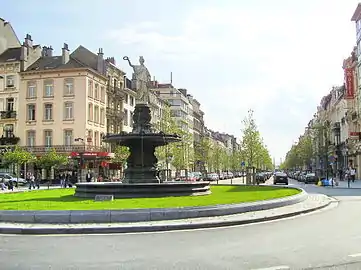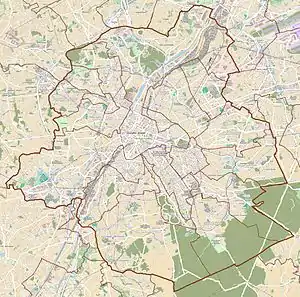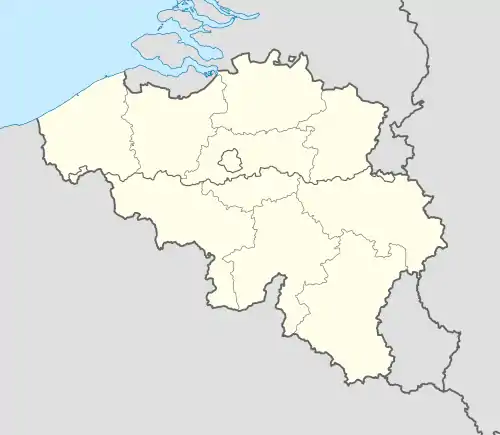 The Place Rouppe/Rouppeplein and Avenue de Stalingrad/Stalingradlaan in Brussels | |
 Location within Brussels  Place Rouppe (Belgium) | |
| Location | City of Brussels, Brussels-Capital Region, Belgium |
|---|---|
| Quarter | Midi–Lemonnier or Stalingrad Quarter |
| Coordinates | 50°50′34″N 04°20′45″E / 50.84278°N 4.34583°E |
| Construction | |
| Inauguration | 1841 |
| Other | |
| Designer | Victor Jamaer |
The Place Rouppe (French) or Rouppeplein (Dutch) is a square in central Brussels, Belgium. It is named in honour of Nicolas-Jean Rouppe, the first mayor of the City of Brussels following the Belgian Revolution of 1830.[1] Rectangular and symmetrical in shape, it is located in the Midi–Lemonnier or Stalingrad Quarter (southern part of the City of Brussels), between the Rue du Midi/Zuidstraat and the Avenue de Stalingrad/Stalingradlaan.[2]
History
The Place Rouppe was inaugurated on 26 September 1841 as a forecourt for Bogards' railway station, Brussels' first South Station, so-called for the former cloister of the Bogards' convent whose site it was built on, and to which the Rue des Bogards/Bogaardenstraat is nowadays the only reference. The former presence of a station at this location also explains the unusual width of the current Avenue de Stalingrad/Stalingradlaan, which goes from the square to the Small Ring (Brussels' inner ring road), a reminder of the train tracks that used to run in its middle.[1]
_(14740516436).jpg.webp)
In 1848, the Rouppe Fountain was inaugurated in the middle of the square. It was designed by the architect Joseph Poelaert and the sculptor Charles-Auguste Fraikin. In 1869, a new South Station was built on the site of the current Brussels-South Station, because Bogards' station had already become too small. The current layout, a central square surrounded by a cast iron gate and rows of trees, dates from 1884 and was designed by the city's architect Victor Jamaer.[2]
Rouppe Fountain
Since 1844, the centre of square has been occupied by a monumental fountain known as the Rouppe Fountain. This monument, the work of Joseph Poelaert, and originally bearing a medallion bust of Rouppe, was inaugurated in 1848. It was inspired by the fountains of the Champs-Élysées in Paris.[2]
The fountain is made up of two basins; the water from the upper bronze basin flows into the lower blue stone basin through twelve lion mouths. At the request of the City of Brussels, the sculptor Fraikin, a former student of the Royal Academy of Fine Arts in Brussels, replaced the original medallion with an allegorical white marble statue representing the City of Brussels. She holds a laurel wreath in one hand and wears a reproduction of the Cathedral of St. Michael and St. Gudula on her head.[3]
See also
References
Citations
- 1 2 Gérard 2023, p. 23.
- 1 2 3 "Place Rouppe – Inventaire du patrimoine architectural". monument.heritage.brussels (in French). Retrieved 3 February 2022.
- ↑ "Bruxelles - fontaine Rouppe". Musée de l'Eau et de la Fontaine (in French). Retrieved 21 December 2023.
Bibliography
- De Roose, Fabien (1999). De fonteinen van Brussel (in Dutch). Tielt: Lannoo. ISBN 978-90-209-3838-8.
- Gérard, Hervé (2023). Bruxelles et ses places (in French). Brussels: 180° éditions. ISBN 978-2-940721-32-0.
External links
 Media related to Place Rouppe/Rouppeplein at Wikimedia Commons
Media related to Place Rouppe/Rouppeplein at Wikimedia Commons